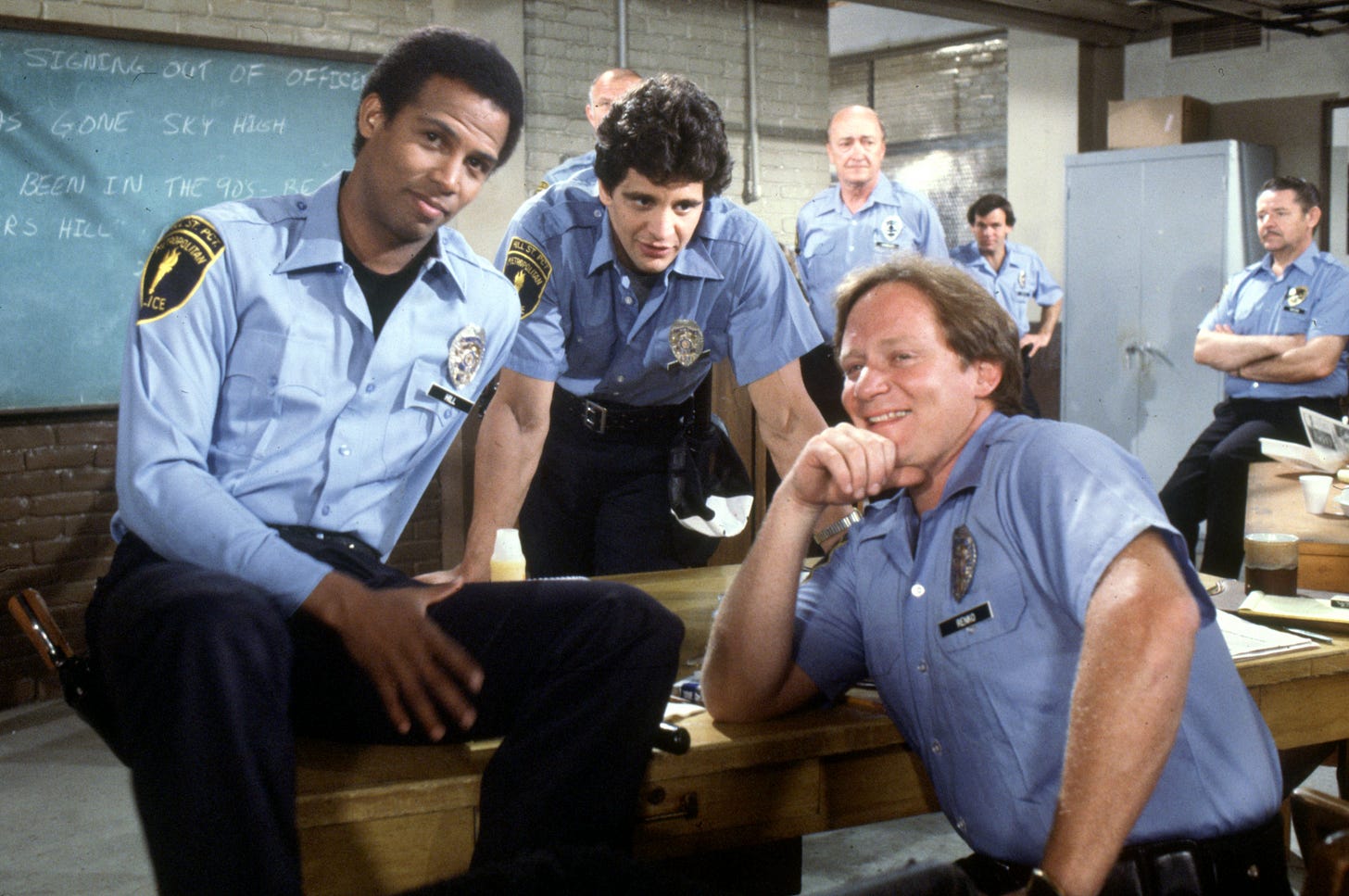TV Unspooled: Hill Street Blues, "Trial By Fury"
Let's look at another TV episode
Hey, just a heads up that this is a shorter newsletter than usual. Didn’t find a great take on this episode, and that’s my bad. For those new around here, the game on this feature is that I watch an episode of a TV show I’ve never seen before and write about it. And sorry I missed last week’s newsletter, though I did write an article in Vanity Fair if you’d accept that as an alternative.

When did the modern era of American TV drama start?
Was it with The Sopranos? It has a strong case. Sopranos wasn’t the first premium cable drama, but it was the first great premium cable drama, using its storytelling and content freedoms to take the medium to new and different places.
Was it with ER? That show ratcheted the medium up a notch, creating high energy situations and a sense of intensity. As TV and film writer/producer Zack Stentz recently noted, ER kickstarted an era where the medium “has become increasingly adept at cramming every scene with story points [and] information”.
Was it with Twin Peaks? It took both the soap opera and police genres and filtered them through whatever goes on in David Lynch’s head. It’s the earliest indicator that it was possible for a broadly appealing series to be aesthetically different and “arty”.
But there’s another argument. It’s an argument for a show you’ve probably read about if you’re serious about TV, but otherwise hasn’t left much of a cultural footprint. It’s a show I had only really heard about in terms of how innovative it was. You’ve read the title of this article, so there’s no point in pretending anymore: I’m talking about Hill Street Blues.
Based on “Trial by Fury”, the show feels like an attempt to bring the innovation of 1970s sitcoms, with their social realism and comments on issues of the day, into the police procedural space. In some ways, TV is a medium better suited to these conversations than film. It’s more immediate, able to come closer to real world events. And it’s going straight into people’s homes. There’s at least some self-selection with a movie. Get Out was a great film about racism (along with being a great work of entertainment), but one suspects there weren’t too many white conservatives who bought a ticket. Even though you can change the channel, TV has the power for people to stumble onto something.
The most prominent “issue” in “Trial By Fury” was that of drug addicts attacking a nun (I’ve cleaned it up a touch). It has more nuance than this, and does allude to racism, but something about building a plot around black men attacking a helpless white woman didn’t quite sit right with me in 2020. This is the nature of the beast of social commentary. Something can feel of its time very quickly.
The same is true, in a slightly different way, for another plot around a gay male sex worker. The show was not actively hateful towards him, and I understand this is revelatory in and of itself. But it nonetheless felt derogatory. This was an almost comically effeminate gay man, who couldn’t comprehend the tough realities of the real world. He’s someone who clearly lived a poor life but apparently knew nothing of the harsh realities of the world. He didn’t feel like a real human being. It was presented that his big failing was not being “tougher”, playing into all sorts of homophobic tropes. Perhaps worst of all, it painted him as a classic prostituted character, having no agency and existing to be exploited despite a heart of gold. It just didn’t sit right with me.
But the episode really does have power in the tone it creates. This is a grounded show, depicting the hard police work in a city as a living organism. As such, there is a lot of documentary-esque shooting style, giving us both a ground level view but also an understanding of the wider system. It’s here where the show really shone for me, and that’s the aspect I’d come back for.
I wish I had a more thoughtful take here, but hey, that’s the fun of the newsletter.

